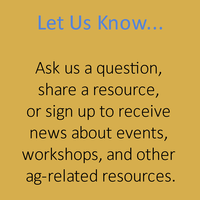Curriculum

The free 4-H Curricula contains modules varying from Animal Sciences to Environmental Education to to Science Literacy to Plant Science, Agriculture, and Gardening. There is also an active Marin County 4-H Program with many regional clubs throughout the county. For information on a short course on Embryology with lesson plans and site visits, contact PeeBee van den Toorn with the 4-H Youth Development Program at LVandenToorn@ucanr.edu or (415) 473-4204.
4-H Water Conservation Curriculum: “There’s No New Water!”
There’s No New Water! is a water conservation and water quality curriculum grounded in a simple, yet powerful, concept that water is a finite natural resource whose quantity and quality must be responsibly preserved, protected, used, and reused.
Agricultural Literacy Curriculum Matrix – New York Ag in the Classroom
The Agricultural Literacy Curriculum Matrix is an online, searchable, and standards-based curriculum map for K-12 teachers. The Matrix contextualizes national education standards in science, social studies, and nutrition education with relevant instructional resources linked to Common Core Standards.
California Foundation for Agriculture in the Classroom
Free lesson plans, teacher resource guides, games, and more.
Center for Ecoliteracy: Rethinking School Lunch Guide
Downloadable pdf that makes the argument for reforming school food and lays out steps for planning a change.
Cornell Garden-Based Learning
Their mission is to provide educators with inspiring, research-based gardening resources and professional development to support engaging, empowering, and relevant learning experiences for children, youth, adults, and communities.
Dig It, Grow It, Eat It
Curriculum resources on edible plants and nutrition for third and fourth graders. Students will learn to identify edible plant parts and about how plants grow, including the science of pollination and propagation.

Food, Land & People's Resources for Learning
Food, Land & People's science- and social sciences-based curriculum, Resources for Learning, serves Pre-K to 12th grade students. Developed and tested by educators around the country, lessons range from environmental science and stewardship to human populations and land use issues.
Got Veggies? Garden-based Nutrition Education
Got Veggies? is curriculum for children as well as adults that combines the fun of gardening with nutrition education
Greenhouse Manual for Educators
A collaborative effort by the National Center for Accessible Technology (NCAT) and the US Botanic Garden, this manual provides educators with information on choosing and using greenhouses with guidance throughout for incorporating greenhouse propagation into classrooms and other school garden initiatives.
Junior Master Gardener Teacher & Leader Guide
The 2016 revised JMG Teacher & Leader Guide provides elementary teachers with the tools to teach the world of gardening with eight chapters of novel, hands-on and proven lessons. The curriculum also helps develops life skills, includes career exploration and provides opportunities for students to culminate the JMG experience with service-learning projects.
LiFE: Farm to Table & Beyond (Columbia University)
This curriculum helps students in grades 5 or 6 to develop an understanding of systems and examing the interacting parts of food systems. They engage in hands-on investigations of they cycling matter in nature and human impact on this cycle including energy and resource use in processing, packaging, and transporting food.
LiFE: Growing Food Curriculum (Columbia University)
This curriculum guides students in grades 4-6 in hands-on investigations of photosynthesis, explore food webs, discuss and debate managing agricultural systems, and more. They use scientific reasoning to explore and analyze their personal food choices and they apply what they have learned to personal decisions related to food systems, health, and the natural environment
Marin County Stormwater Pollution Prevention Program
MCSTOPPP offers educational tools for understanding your local watershed, including free coloring books, activity guides, plant cards, composting guides, a diorama, and a puppet show.
Marin Master Gardeners School Garden Program
The goal of Marin Master Gardener School Garden Program is to help schools set up sustainable gardens that create healthy environments for students to learn in. Their website includes information on planning and building a school garden, as well as information on integrating curriculum into your school garden, and other school garden resources.
Nourish: Food, Health & Sustainability
Nourish is an educational initiative designed to open a meaningful conversation about food, health, and sustainability.
CAFF, SlowFood and other organizations support food & farming education in the classroom.
Visit our page of Resource Agencies and Ag Partners for more ideas.



